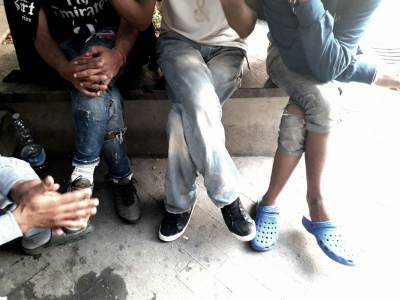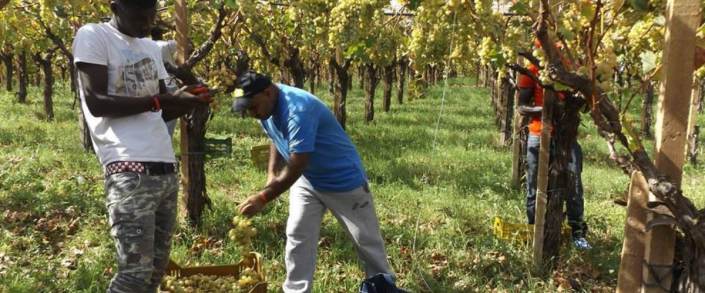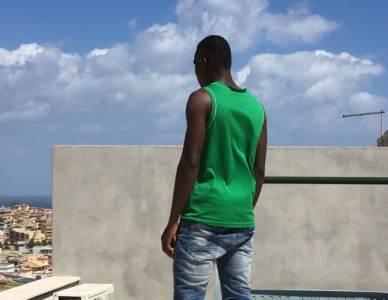Happy birthday little one
Everyone who has had experience in the immigration “sector” – no matter what role that covers – will have had at least once in their life, said, heard and/or nodded to the phrases “in reality there is no emergency”, “…we’re talking about a structural problem” or even “the emergency serves to construct other discourses.” Foucaultians and non Foucaultians alike. Amongst the many possible textbook phrases it is useful to conclude with “the emergency allows us to make exceptions … ” since it introduces an aspect which is perhaps less acknowledged: Emergency produces Emergency.
The second statement is true. To have understood/unmasked the creation/fiction of the first statement does not repair the consequences of the second. The reflection, personal and who knows perhaps collective, is the following: knowing the first how do you respond to the second? Is it possible to avoid its development? And how much time does it need? This last question will be clear only in explaining what we are confronting at this point: the problem of the minors that have recently reached the age of majority. A problem so imposing that, excusing the irony, it seems to create yet another category which goes directly between that of unaccompanied foreign minors and adults.
In the meantime many of the minors who reached the age of majority end up on the street.
This despite the fact that the emergency has already been marked in the calendar as happening on the first of January 2018. To be more clear. Sicily is the principal zone of landing/disembarkation. The redistribution of migrants across the entire national territory was done so that it would lose its prize of first place – in terms of numbers – of regions who have received most migrants. But this is not the case for minors. The last available official data – added on the 30th November 2017 – showed how Sicily would only accommodate 43.9% of the total of unaccompanied foreign minors present and who were registered on national territory. The same report indicated that the most represented was the 17 year old age bracket , that is, 60% of the national total present in Sicily.
Translated into numbers: as of the 30th of November, out of a total of 18,508 unaccompanied foreign minors present in Italy, 8,116 had been received on regional territory. Of these, 11,106 were 17 years old. Even if we do not have the official data it is a legitimate hypothesis that many would have reached, at least on paper, 18 years of age on the 1st of January 2018. For years, in fact, it has been criticised how in so many cases, migrants at the point of disembarkation have had their year of birth recorded and then their date of birth arbitrarily attributed to the 1st of January.
Official evidence of such procedures lies in the 31st of January 2016 report in which is stated that “data concerning the minors present on the 31st of January reveals that 1.300 persons less have arrived in comparison to the report of 31st of December 2015. Such a significant decrease is in part due to the fact that many minors who are waiting for formal identification are registered with a date of birth as the first day of the year. Therefore all the minors who consequently have the date of birth of 1/01/1998 do not result in the database in the month of January, having reached the adult age.”
It was therefore known by the relevant authorities that all the minors of 17 years old in “wait for formal identification” would have reached the age of eighteen on the first day of last month. But how many amongst the more than 11 thousand registered as of November 2017 found themselves in that condition? And how many of these were removed from the centres? Unfortunately we are not in the position to answer to either of these questions, but we can elaborate on some specific cases and illustrate the circumstances that could have affected all the minors excluded from the reception circuit.
First of all, it is worth remembering the possible mistake of perception. The chronic nature of some holes in the so-called reception system could induce it to remain immobile and immutable. In reality it is characterised by a formidable elasticity:
Inaugurations, closures, winter breaks, reflection breaks, failures and modifications of the intended use of the receptions centres are part of the daily agenda. When the permanency of the guests within the centres becomes vital for the running of a centre and when the survival of a centre outweighs the rights of the people that should be its beneficiaries we are faced with a dangerous short-circuit.
Let us analyse, for example, how much has changed within the structure of reception for minors. The recent past has seen minors staying blocked in the first level reception centres because of the unavailability of free spots in the structures of the second level. Many managing bodies complained about such conditions because they impeded integration and forced them to “manage” the frustration of the guests. As a matter of fact it is reminiscent of the state of limbo that used to characterise the reception of migrants – summarised by mere subsistence and accommodation – with the structures of the first level reception guilty of not processing/requesting/demanding the initiation of any procedure (guardianship, permission to stay for minors, possible requests for international protection etc…).
The subsequent reduction in arrivals and the simultaneous opening of numerous structures of second level reception has produced, today, opposed situations: the managing bodies of some of the first reception centres tend to delay the transfers so as not to go underneath the minimum threshold “to cover expenses.” The same happens in various second level centres that do not enact transfers, not sending, for example, requests to the Central Service for admissions into the SPRAR* circuit. Others go even further: it has often been mentioned that centre managers often leave the province, and at times the region (in Calabria), in search of minors to place within their structures. There are no limits, and especially no geographical ones. We have also learned that in order to obtain the admission of new guests second level reception centres are required to pay a compensatory payment for the missing income to the first level reception centres.
Leaving aside the final reflections that could and perhaps should arise from what has been reported, let us look at how this context impacts the fate of young adults recently turned eighteen.
Generally in the past the conditions of the overcrowded centres for minors led to a transfer of minors that have newly reached eighteen years of age into the CAS for adults and/or the SPRAR centres. Not that there were no issues in that regard. All minors that reached eighteen years inside a first reception centre – managed following the above described procedures – found themselves, after months and at times years, starting the procedure for recognition of international protection as adults. In this way, they have lost precious time but also the possibility of benefitting from the rights entitled to minors.
And what is happening now? Why are there so many more newly eighteen year-olds ending up on the street this year?
Our impression is the following: in reality the problem of available spots is connected mainly to the structure of reception for adults. It leads to greater difficulties in the arrangement of transfers of minors who recently turned eighteen to the reception centres for minors. The shortage of spots for adults – based on the Interior Ministry’s expected quota – would explain why in the Palermo Province, among those of the Western basin , there are more cases registered. One could object, in a way correctly, that the phenomenon is simply more visible in Palermo thanks to the presence of an attentive and active civil society. The latter has certainly proved to contribute fundamentally to alerting and soliciting an intervention by the relevant authorities. As seen by what happened mid last month when two structures of primary reception, Azad and Elom, managed by the Asante association, posted the following announcement on their doors (in Italian and translated in both French and English):
According to the decision of the Prefecture of Police, all those who have reached the age of majority and have received a response from the Commission must leave the centre TODAY. Names below.
The intervention of the Commune, represented by the local Councilor for social policies Mattina, and probably the media coverage that followed prevented the possible event for the 14 kids who were at risk of ending up on the street that same day.
Beyond this one intervention, we want to positively mention the note from January 11 sent by Councilor Mattina to all those administrative bodies that manage reception centres for unaccompanied minors, clearly signaling them “(…) to act in order to find possible solutions, as they result being aware of the phenomenon and its actual consequences“. Apart from that however the first line of the above reported phrase “according to the decision of the Prefecture” appears to be relevant. We do not have news of circulars in that regard but it would seem that the Prefecture of Palermo – and the same would apply for Agrigento and Trapani – have interpreted the legislation in a largely restrictive way. The simple notification of the decision of the Commission becomes the deadline for the reception of the minors who have recently reached the age of majority within the structures for minors.
We ask ourselves what brought about such a new approach. Was it born from the need to avoid centres for minors covering the absence of minors by receiving the ones who recently turned eighteen? Is it a clumsy, if not to say illegitimate, attempt to alleviate the pressure on the reception centres for adults by freeing them from more guests?
Finally: if the 1st of January date is attributed in “wait of formal identification” how is it possible that even after the hearing at the Commission so many are born on that date? 14 in two adjoining structures? Or perhaps due to missing evidence that certifies their date of birth, they were left with the contrived date?
In that case why not mark a different date? For example the 31st of December? At least on paper that would protect the “minors’ greater interests.”
Elio Tozzi
Bordeline Sicilia Onlus
Translated by Meg McLellan






